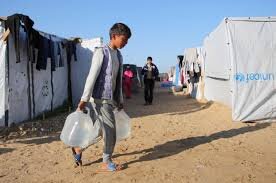UNICEF issues Gaza warning

TEHRAN – The United Nations Children’s Fund (UNICEF) has warned that kids in Gaza risk dying from thirst after the region’s water systems collapsed.
UNICEF says the breakdown of Gaza’s water infrastructure is putting the Israeli-blockaded Palestinian territory in danger of extreme drought and worsening hunger.
UNICEF spokesperson James Elder told journalists in Geneva that he has received many reports of women and children being hurt while trying to get food aid — including a young boy who was struck by a tank shell and later died from his wounds.
“There have been instances where information was shared that an (aid) distribution site is open, but then it’s communicated on social media that they’re closed, but that information was shared when Gaza’s internet was down, and people had no access to it,” Elder said.
Food is now extremely limited in Gaza after the Israeli occupation imposed a strict blockade on all supplies throughout March and April. This has pushed many of the 2.4 million residents to face a “critical risk of famine.” We are way below emergency standards in terms of drinking water for people in Gaza. Children will begin to die of thirst … Just 40% of drinking water production facilities remain functional.”
Although the Israeli regime eased the blockade somewhat last month, the UN’s attempts to deliver aid have faced huge challenges, including blocked roads filled with rubble, Israeli military restrictions, ongoing airstrikes, and increasing chaos on the ground.
Fuel, which is essential for running water pumps and Gaza’s only remaining desalination plant, is also in critically short supply. None has been allowed in since the U.S.-backed genocide resumed in March.
Elder stated, “We are way below emergency standards in terms of drinking water for people in Gaza. Children will begin to die of thirst … Just 40% of drinking water production facilities remain functional.”
To conserve fuel, the UN reduced the operating hours of water, sanitation, and hygiene services in Gaza by 20% in May.
Aid workers say that the limited fuel stored during a lull in the 20-month war is now nearly gone.
Most of Gaza’s facilities for treating wastewater, along with its sewage systems, reservoirs, and pipelines, have been destroyed.
In March, the Israeli occupation regime also cut electricity to the main desalination plants, which are a critical water source for Gaza’s people.
The occupation regime is pushing for a U.S. company, the so-called Gaza Humanitarian Foundation, to take over aid delivery in place of the previous system managed by the UN.
However, UN agencies and major humanitarian organizations, which have been distributing aid in Gaza since the genocide began more than 20 months ago have rejected the proposed system. They say it is unworkable, insufficient, and morally unacceptable. They also deny the accusation by Israel that Hamas is stealing any of the aid.
According to the director of the Gaza health ministry, on average, the Israeli occupation forces kill a child every 40 minutes.
Leave a Comment